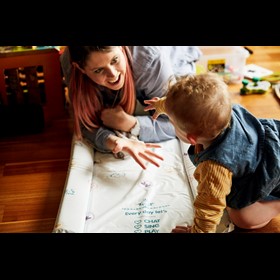Wonder Words
Jane Lewis, Head of UK Programme Development and Quality at Save the Children
I grew up in a very talky family. My mum was a speech therapist, my dad was a wonderful storyteller. Meal times were for chat, we had bedtime stories, on car journeys we played I-spy and The Lorry in Front. I was actually slow to talk myself - apparently I mostly sat in the garden eating grass. But I was a real talker by the time I started school.
That’s miles away from the experiences of the families we work with at Save The Children. Poverty squeezes out the space for language development in insidious and persistent ways. It creates a constant stress and tension, a focus on the here and now. Parents often feel judged and unconfident, don’t value themselves as talkers or as helpers of children’s development, and might not have experienced playful talk – or even play – themselves. There isn’t the money for books, nor the physical and emotional space for bedtime stories.
Every family is different. Some have rich cultures and habits of storytelling and talk. I have immense respect for parents who, despite difficult circumstances, build talk into every day. The mum who had her baby in stitches through a vigorous game of peekaboo, the dad who pretended to be a monster so his son could talk about all the ways to attack him, the parents who made pizzas with their kids and talked them through every stage of the process. But it’s no wonder that so many children growing up in poverty miss out on early language development. Analysis carried out for Save The Children has found that the poorest children are as much as 17 months behind the best off in language development by the age of 3, and teachers in the communities we work with tell us that more than half the children starting at their school don’t have the communication they need. And parents are absolutely key to making the difference.
There is lots of great work going on to address this, not least the important work in Family Nurse Partnership, and the recent calls for language development to be a more central part of health visiting are really important. But we need to do more to reach all the parents who need help to stimulate their children’s talk. We can’t just see this as the work of services. It’s a much wider social responsibility.
That’s why at Save The Children we’ve been developing a new initiative, Wonder Words. Based on behavioural science and ‘nudge’ theory, it’s about giving parents cues and nudges to get them to talk more to children. We’re giving them ideas of how to build talking, singing and playing into everyday routines – because it’s fun and because it makes for happy children and happy parents, as well as because it helps to build language. We’re using the whole social infrastructure to reach parents and developing partnerships with corporates and others to do this, aiming to reach families through the products they have in their homes, their favourite brands, social media, local communities, shops, parks and so on. We want to create an ‘echo chamber’ where parents see reinforcing nudges and playful suggestions about talk everywhere, and it becomes the new norm.
Based on ethnographic research with families, and on working closely with them, we’ve developed and tested some initial products including a changing mat, toy caddy, bib and bath mat. We’re developing an interactive chatbot which provides prompts based on families’ individual daily routines. We’ve been trying out bus-stop adverts, and lots more. How great would it be if, on the way home from nursery, a parent and child walked through a park where ideas for talk were built into the swings and slides; sang a silly song from the bus stop poster while they waited; used the chatbot on the bus to find some bus-related talk ideas; popped into a shop which had turned the fruit and veg section into a word game; and then used games and tips on food packets for ideas for chatting, singing and playing as they made and ate tea!
We’re also supporting the DfE’s plans for a public campaign, and there’s lots of great innovative work going on within the sector. It’s going to take all of us working together to narrow the language gap and to help parents to do what every parent wants to do:to give their child the best possible start in life.
References
1. Save The Children (2014) Read On Get On https://resourcecentre.savethechildren.net/library/read-get
2. https://vivbennett.blog.gov.uk/2019/02/10/closing-the-word-gap-the-leadership-role-of-health-visitors-by-wendy-nicholson/
3. https://www.gov.uk/government/speeches/children-and-families-minister-announces-new-early-years-funding
